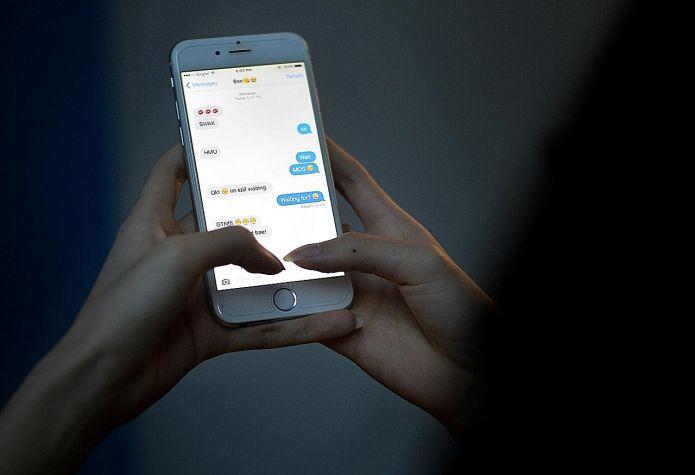Nude and lewd: Teens hide behind secret words to conceal dirty messages
Experts say teens as young as 14 are snapping and sharing naked photos and sexually explicit videos
The next time you're at a restaurant, look around you.
You will probably see a family having a meal together, but with nobody really talking.
The children are likely to be immersed in their phones, which, to them, is their world.
Mum and dad, do you know what your children are up to?
Dr Thomas Lee, consultant psychiatrist and medical director of The Resilienz Clinic, said: "The primary thing is to be aware what your kids are doing online so they are not exposed to harmful material.
"We are talking about 'sexting', sexual content, violence. Teens are still immature in terms of decision-making and judgment, so it is important to know what they are doing, so parents can give them the guidance."
But do not expect to get clued in by your children. They are likely to hide their secret agenda behind coded acronyms.
And when parents do uncover the truth, it can be shocking.
Dr Carol Balhetchet, senior director for youth services at the Singapore Children's Society, recounted a 14-year-old girl who was caught sexting after her mother came across nude pictures on her mobile phone.
Dr Balhetchet told The New Paper: "Her mother said that what she found was graphic and very sexual in nature. She was embarrassed to even show us the pictures and text she had found.
"After much probing, the girl's cousin, who had access to her Facebook account, let her mother (gain access). What she saw traumatised her.
"There was a whole bunch of sexual messages and pictures that were being sent to the boy. He was 18 and not from her school."
Such behaviour may be more commonplace than parents want to believe.
BOLDER
"In this era, teens are adamant on going as close to the edge without actually 'committing the crime'.
"These acts, they feel, make them look bolder, cooler and prop them up in popularity," Dr Balhetchet said.
Dr Lee added: "There have been surveys done in the US and in the UK that show that adolescents are sending and receiving sexual content, images and videos.
"The numbers are really high and a lot of times, kids are doing it behind their parents' back.
"Parents can check their children's e-mails, befriend them on Facebook... But posts can be deleted and privacy settings can be tailored.
"There are also so many apps available, like Snapchat, that help them cover their tracks."
Snapchat is an app that allows users to take photos, record videos, add text and drawings, and send them to a controlled list of recipients.
These 'Snaps' let users set a time limit, like between one to 10 seconds, for viewing their Snaps before they are deleted from the company's servers, claim the app's developers.
Dr Balhetchet spoke of another case involving a 13-year-old girl who had a few boyfriends whom she had befriended on the Internet.
Her parents caught her with Neoprints - stamp-sized snapshots printed on stickers - of her and a 15-year-old boy from her school.
In the photos, she had taken her top off.
She said: "According to our sessions with the family, she was a good girl and this behaviour only started recently.
"When I asked her why she did it, she said 'It was fun and daring'."
"In the end, the whole family unit had to come for counselling - the girl and her parents.
"While I talk to the parents and the child separately, it is important for the parents to know how to forge a close relationship with the child despite their busy work schedules."
In this era, teens are adamant on going as close to the edge without actually 'committing the crime'.
- Dr Carol Balhetchet on why teens are drawn to sexting
Parents, 'control' through trust
So how is it that parents don't know what their children are up to?
Dr Thomas Lee said: "Kids are a lot more savvy than most of us. They know how to cover their tracks, whether it's by using a private browser, using code language, or deleting (browsing) histories - they are continuously getting better every day."
But Dr Carol Balhetchet said it is not about whipping out a magnifying glass and looking for clues.
"The best way to control (your child) is to trust and the best way to trust is to have a relationship.
"You cannot have trust without a relationship because then it's not authentic trust. If you have a good relationship with them, then the child will feel a different kind of guilt when they are faced with compromising situations."
When parents do learn the truth, Dr Balhetchet said they can react badly.
GIRLS' HOME
In the case of the 14-year-old girl, she was put under a statutory supervision order after her mother applied for a Beyond Parental Control order.
"She was in a girls' home for about six weeks pending the investigation after the girl's mother made a police report against the 18-year-old boy.
"Her phone and her computer were confiscated and she was put in an 'open institution', where she reports for school on Monday and is only allowed to 'book out' during the weekend or on public holidays."
Dr Balhetchet said such actions are just a temporary measure.
She said that once parents allow their children to have a mobile phone, even if the children are only in primary school, they need to introduce them "to the virtual world".
"Parents need to incrementally and gradually introduce them to this world. They need to instil in the child that every action online has a consequence."
Is your teen sexting?
r Thomas Lee and Dr Brian Yeo, both psychiatrists in private practice, say there are behavioural changes parents can look out for:
1 More time spent online via different devices
The moment this happens, parents should be "more curious" as to why the child is paying more attention to his or her devices.
Dr Lee said: "It's important to know exactly what they are doing in the online world, especially if they have increased the amount of time they dedicate to it."
2 Secretive behaviour
This, Dr Lee said, is a red flag.
One clue is when you continuously hear them talking very softly on the phone in the middle of the night.
"When the kids start becoming more secretive - like using their phones under the blanket in the dark, or leaving their phones in very hidden places - chances are, there is something that they don't want you to know," he said.
3 Emotional change and absences
When a child becomes more withdrawn within the household, it is a call for concern said Dr Lee.
"When you start to notice they are never home or they disappear overnight before coming back the next morning, you should immediately find out what they are getting up to," he said.
4 Anxiety
While it is hard to track your child's every move online, parents should notice if there is a change in the way they react.
Dr Lee said: "When they start getting jumpy or are quick to close windows or sign off (from) their social media accounts whenever a parent walks into the room, then it's quite clear there is something they don't want you to see."
5 More provocative dressing
With their increasing sexual awareness, Dr Yeo said some teens change what they usually wear.
"When you keep doing the same thing over and over again, it gets boring," he said.
"That's when these teens will probably feel the need to up their game, purely because it's something new for them and it's thrilling.
"You will probably see them start dressing more provocatively than they used to."
MORE THAN JUST LOL

Text speak.
What started as shorthand has turned into a new language, especially among teenagers.
And they have created a slew of abbreviations to communicate with each other secretly or make plans that they conceal from their parents.
Here is a list of abbreviations to help parents decode some lesser-known teenage babble:
DTF - Down to f***
NIFOC - Nude in front of computer
GTN - Got them nudes
(The first three refer to making explicit plans)
HMU - Hit me up
PIR - Parent in room
KPC - Keeping parents clueless
LMIRL / MIRL - Let's meet in real life / Meet in real life
MOS - Mom over shoulder
SWAK - Sealed with a kiss
J4F - Just for fun
KFY - Kiss for you
IYKWIM - If you know what I mean
Get The New Paper on your phone with the free TNP app. Download from the Apple App Store or Google Play Store now


